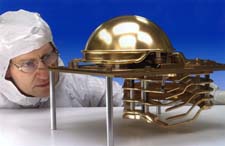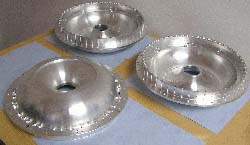Meet the IBEX Team: Eric Hertzberg

As a physics major at Antioch College in his hometown of Yellow Springs, Ohio (population 3,500), Eric Hertzberg "didn't have a clear idea" of what he would do after college graduation. But to fulfill Antioch's work-study requirement while still a student, he took a co-op position at the Lockheed Martin ATC in Palo Alto, California. He has never since held full time employment anywhere else.
"I was fortunate to fall into a position that opened lots of doors," Eric said. "[After finishing my co-op], I was able to stay on [at Lockheed Martin]. It was just a wonderful place to work with many fascinating challenges and opportunities for creativity. Hardly anyone left for 30 years. We had a terrific group that worked well together, so why would anyone want to leave?"
On-the-job learning and an excellent mentor, Dr. Edward Shelley, meant that a bachelor's degree (BA) in physics was sufficient for Eric and most of the other engineers in the LMATC space sciences group at the time (exception: electrical engineers) to master the engineering skills they needed. Engineering support could be had from textbooks or colleagues. "Ed's surpassing understanding of physics, combined with rare engineering capabilities, taught us to view problems from the perspective of physics, and to attempt always to solve problems starting at the most fundamental level. This approach has been the most valuable part of my career training," Eric said.
As the Lead Engineer for the IBEX-Lo Sensor, keeping track of the big picture is all in a day's work. "Part of my job is to coordinate the six organizations working on the IBEX-Lo sensor so that the overall conceptual design stays focused," Eric said. "With so many organizations, engineers, who have a clear view of their own individual tasks, may still loose sight of how their efforts fit into the total [project]. I'm trying to make sure that our activities all continue to converge, compatibly." The IBEX-Lo sensor team includes the University of New Hampshire, The Applied Physics Lab at Johns Hopkins University, the NASA Goddard Space Flight Center, the University of Bern in Switzerland and the Swedish Institute of Space Physics, as well as the Lockheed Martin ATC where Eric works.
Coordinating the teams of engineers working on the sensor in different parts of the world means that Eric often spends up to thirty percent of his time communicating via teleconferences. This collaboration is one of the best parts of his job, but also one of the most exhausting. "One of the things I like best about this program is working with a truly stellar team of scientists and engineers," Eric said.
As space science advances, anyone wishing to have a job like his needs advanced schooling. "I'd never get in the door now without at least a master's degree in engineering. The whole business of space science is becoming much more formalized and requires advanced and specialized software skills," he said. Future space science engineers must also learn enhanced writing skills. "I spend too much of my time doing technical writing, but it is unavoidable," Eric said.
In spite of the increasing formalization of space science, Eric thinks that we've barely begun to explore our Universe. "I think that there's still a huge amount to learn [about space] and it will be exciting for people for decades, even centuries, to come - so long as there's funding!" Eric said.
Eric has found his space science job so enjoyable that he plans to keep working so long as he can, even though he could retire to devote more time to his hobbies: wine tasting, cycling, bird-watching, maintaining and repairing his 1910 home, and visiting his wife's family in France. "I'm into retirement age, but I really enjoy this business, so I hope to keep at it for at least five more years," he said.
